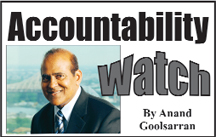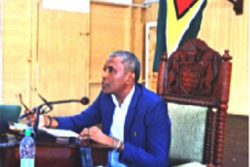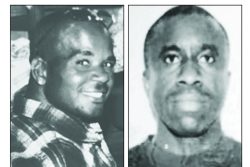Introduction
 The Transparency Institute of Guyana Inc. (TIGI) held a press conference last Wednesday to announce Guyana’s ranking on the 2012 Corruption Perceptions Index. This provoked a reaction from the Progressive Youth Organisation, the youth arm of the PPP, which issued a press release condemning the methodology used in arriving at the index. Included in the release was a personal attack on me as follows:
The Transparency Institute of Guyana Inc. (TIGI) held a press conference last Wednesday to announce Guyana’s ranking on the 2012 Corruption Perceptions Index. This provoked a reaction from the Progressive Youth Organisation, the youth arm of the PPP, which issued a press release condemning the methodology used in arriving at the index. Included in the release was a personal attack on me as follows:
TIGI’s Vice-President is former Auditor General Anand Goolsarran who prior to 1992 was widely suspected to have colluded with the PNC to suppress the production of audited accounts and was complicit in the concealment of PNC mismanagement of Government finances. Mr. Goolsarran has never been held to account for his failure to conclude audits prior to 1992. In addition, his personal association with AFC leader Khemraj Ramjattan is widely known, he has made frequent appearances at AFC public events.
I have decided to pen this article in the hope that the public will know the truth about what really happened that resulted in the restoration of public accountability in Guyana in 1992. Much of the information contained in this article was extracted from my book, “Improving Public Accountability: The Guyana Experience 1985 – 2007”.
As regards the second accusation, my association with the leader of AFC predates the formation of that party, and it would be wrong of me to bring my association with him to end because of his new political orientation. In addition, he is our family lawyer. I also never attended any AFC public events. I, however, accepted an invitation to make a presentation on the budget process at which all Members of Parliament were invited. I did so in my professional capacity.
Early struggle for the restoration of public accountability
The last set of audited accounts of the Country was in respect of 1981 at the time of my appointment as Auditor General in December 1990. My first task was to bring to the attention of the Minister of Finance, the Accountant General and other senior responsible officials, the requirements of the law relating to financial reporting and audit, and the fact that the said law had not been complied with for over eight years. I also took the opportunity of reminding them of the deadline for the submission of financial statements for audit for the year 1990.
The then Accountant General was adamant that computer problems prevented him from finalizing the public accounts relating not only to the backlogged years 1982 to 1989 but also the year in question – 1990. He could not indicate how soon these accounts would be submitted for audit. Accounting officers, on the other hand, contended that it was the Ministry of Finance’s responsibility to process transactions relating to their Ministries and to submit periodic printouts for reconciliation with their records. Because of the absence of such printouts, they claimed that they could not carry out the necessary reconciliations and therefore could not prepare financial statements for audit.
The Audit Office had conducted preliminary audits of ministries and departments and had held its findings in abeyance pending the submission of financial statements. I took the view that in the absence of financial statements, the results of the preliminary audits should be presented to the Legislature. The Government vigorously opposed this view although Section 32 of the now repealed Financial Administration and Audit (FAA) Act permitted me to transmit a special report on any matter incidental to my powers and duties under the said act, if it appeared to me to be desirable. As a result, I sought a legal opinion from the Attorney General on the matter, which opinion supported my view. Without the legal safeguard of Section 32, any government could withhold the submission of financial statements in the hope of thwarting the efforts of the Auditor General to report to the Legislature on the financial stewardship of the Government.
As a result of the legal opinion, the Audit Office issued preliminary reports to the National Assembly for the years 1982-1985. That opinion was subsequently reversed thereby thwarting efforts to produce similar reports for the later years. Meanwhile, I wrote to the Minister in late 1991 outlining the problems associated with the Government’s financial management and making a number of recommendations. I proposed a two-pronged approach to restart financial reporting, with 1991 as the cut-off year. The key recommendations were:
* The closure of all government bank accounts and the opening of new ones with effect from 1992 to avoid any contamination from the backlogged years. The minimum number of accounts should be used;
* Instituting proper systems and procedures to ensure accurate recordkeeping and reconciliation, and to facilitate timely, reliable, and accurate financial reporting for the future, commencing 1992; and
* The setting up of a task force to deal with the backlogged accounts covering the period 1982 to 1991. The Accountant General had estimated it would take approximately six years for the backlogged years to be finalized. In other words, it would have taken until 1997 to bring the backlogged accounts up-to-date, by which time the current year’s accounts would have gone backlogged by four years, hence the recommendation of a two-pronged approach.
Although the Minister accepted these recommendations, they were not implemented despite the Audit Office’s strenuous efforts to influence the Ministry of Finance to do so. When I outlined my frustration to President Hoyte, his reaction was that we were all serving the same interest and that the Accountant General could not submit the required financial statements unless instructed to do so. Meanwhile, I was able to assist the Public Accounts Committee (PAC) in drafting its reports covering the PAC’s examination of the public accounts for the outstanding years going back to the 1970s, using the verbatim records from the Parliament Office. Although these reports could not be located, the fact that in the post-1992 period, the first PAC report was in respect of 1992, would suggest that they would have been laid in the National Assembly during the period 1991-1992.
Renewed struggle for the restoration of public accountability
Following the national elections in October 1992, I renewed my representations to the new Minister of Finance, and met with the Head of the Presidential Secretariat (HPS) and the Accountant General to present my arguments in favour of a resumption of annual financial reporting. The Accountant General contended that it was unprecedented to have a gap in financial reporting and that any attempt to do so would result in inaccurate reporting. The HPS enquired about the level of accuracy that could be achieved if my recommendations were to be implemented.
The Accountant General indicated that such accuracy would be in the vicinity of 60 to 70 percent, to which the HPS responded, “Would a 60-70 per cent level of accuracy not be better than no financial reporting?”
In February 1993, instructions were issued to the Accountant General and accounting officers to comply with the requirements of the law relating to annual financial reporting of the public accounts. As a result, financial statements for the fiscal year 1992 were submitted for audit examination. However, such submissions were not without their fair share of resistance and lack of co-operation from those responsible for preparing the accounts, and it was left to the Audit Office to do everything possible to ensure that annual reporting was restored. At the same time, a task force was set up to look at the backlogged years but the exercise proved impossible, and the effort was aborted.
As was expected, the accounts were somewhat incomplete. Of the 12 consolidated statements comprising the public accounts, two were not submitted. However, individual statements of revenues and expenditures of all ministries and departments, which numbered some 200, were submitted. The Audit Office completed the audit of these statements and accounts within the statutory deadline and I presented my report to the National Assembly, thereby bringing to an end ten years of absence of financial reporting at the national level. Since then, there has been annual financial reporting.
Reaction from the Public Accounts Committee
The restoration of public accountability was not without its criticisms. Because my report for 1992 was extremely critical of the government’s management of the country’s finances, the PAC vigorously sought to challenge its legality and validity. The chair of the PAC was a senior Minister of the previous Administration. The reality was that he was chairing a committee that was examining the Auditor General’s report covering a substantial part of the fiscal year, that is, nine months of 1992, for which his party was in government.
Regardless of how embarrassing it was for some members of the PAC that annual financial reporting and the auditing thereof were restored, it was a glorious opportunity for them to rise to the occasion, to reflect on the words of the late Harold Wilson, and to act accordingly.
The essential fact is that this Committee is a Committee of the House responsible to the House as a whole, and is not a battleground for party faction…. I believe it is true to say that the authority of the Committee is greatly enhanced by its unanimous character and I hope the complete objectivity of its report. It is fair to say that many Honourable Members of both parties have made great endeavours and have sometimes sacrificed personal views to ensure that this shall be so.
However, political expediency took precedence over the broader interest in that those members took an extremely defensive position and vigorously sought to discredit my report. Instead of the Accountant General and accounting officers being asked to explain the deficiencies identified in the report, they were encouraged, indeed prodded, to disagree with my findings.
I was in reality placed on trial. Because of the hostility of the PAC towards me, during the rest of the hearings on the 1992 and 1993 public accounts, I declined to participate in the deliberations.
Despite these criticisms and the attempted vilification of me for almost single-handedly trying to restore public accountability in Guyana, the effort was a landmark achievement, ushering in a new era in public accountability in Guyana.
Conclusion
Having regard the explanations I have provided above, I will now leave the reader to be the judge as to whether or not I was engaged in any act of misdemeanor as Auditor General prior to 1992.
We should all be reminded of Gandhi’s words about truth, some of which I have highlighted at the beginning of this article. My own thoughts are:
Truth is absolute, not relative, and there are no degrees of truth.
Truth is synonymous with godliness, morality and the highest degree of ethical behaviour.
The morally depraved and the intellectually bankrupt will seek to stifle truth, distort it, and engage in falsehood.
A society that embraces falsehood and distortion of the truth is heading for the precipice.
Please e-mail your response to goolsarran@yahoo.com.






